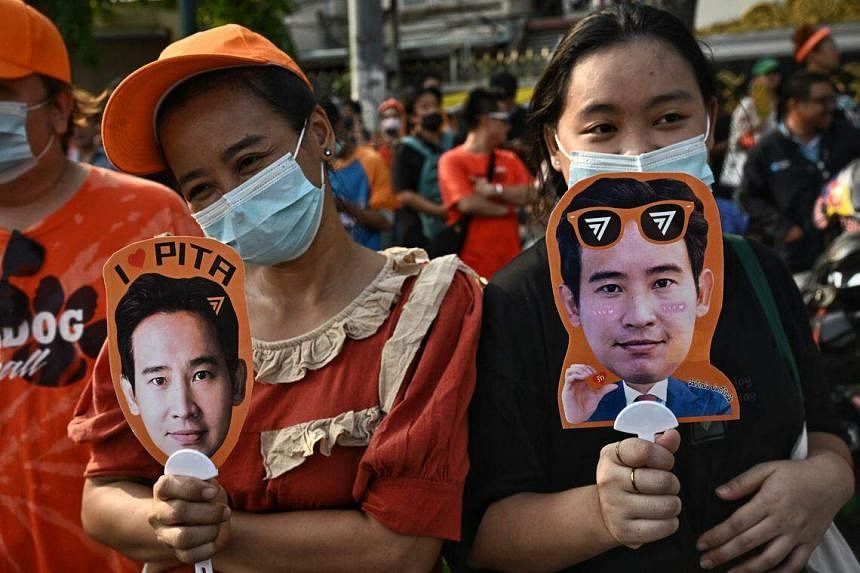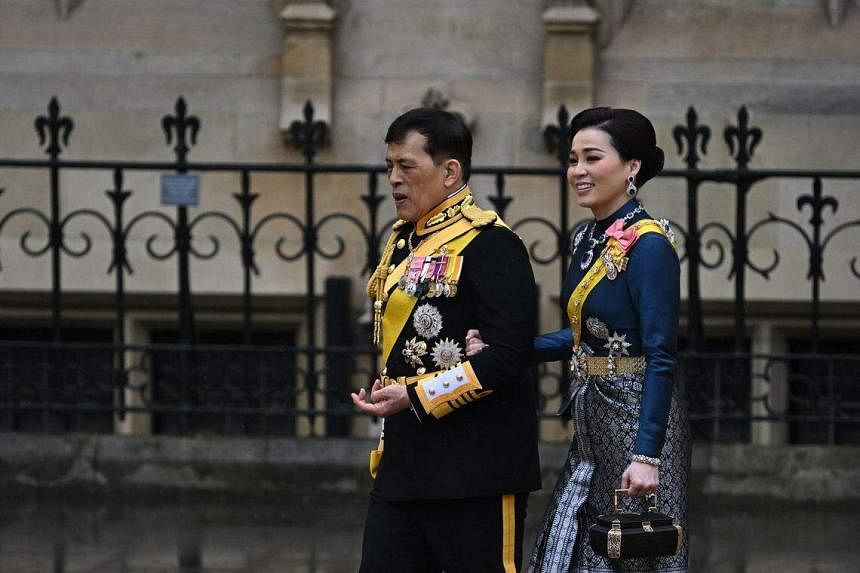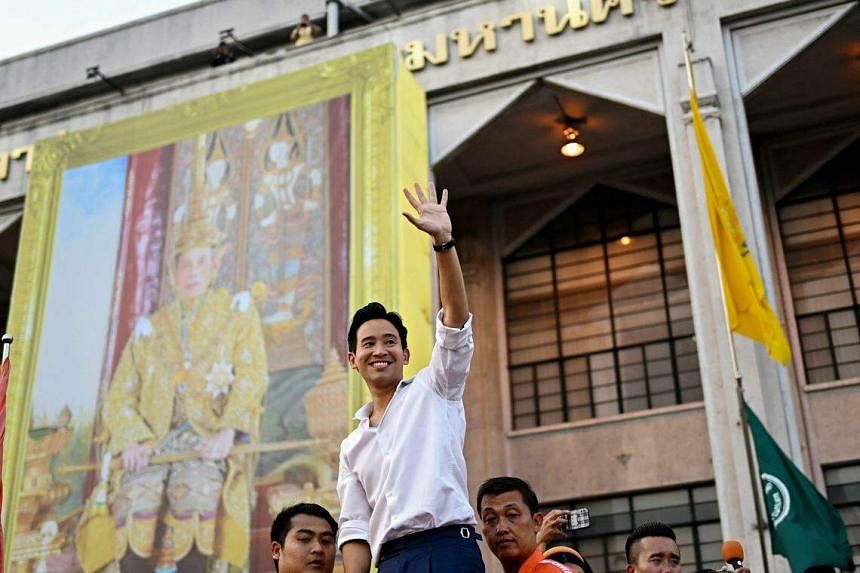BANGKOK – Early in 2022, I asked a politician from Thailand’s Pheu Thai Party which rival he felt was its biggest threat. He did not talk about the parties backed by military generals who had repeatedly ousted Pheu Thai and its predecessors from power. Instead, he named the Move Forward Party (MFP).
His instincts about the progressive young party proved right on May 14 when MFP snatched a surprise election victory from Pheu Thai, a behemoth linked to exiled former premier Thaksin Shinawatra which has won every single poll over the past two decades.
Dismissed as a greenhorn but feared as a wildcard, MFP not only clinched the highest number of constituency seats (112) and biggest proportion of the popular vote (36.5 per cent) in the general election, but it also swept 32 of the 33 seats up for grabs in the capital Bangkok.
Pheu Thai, in second place, has now joined an eight-party coalition led by MFP. Together, the parties hold 312 seats in the 500-seat Lower House. They plan to support MFP leader Pita Limjaroenrat for the post of prime minister. Legislative hurdles put in place by Thailand’s former ruling junta mean that voters might have to wait till August to see whether he can assume Thailand’s top job.
But the 42-year-old former executive director of ride-hailing platform Grab Thailand has already started shaking things up.
Changing up while waiting
While Thai coalition arrangements have tended to be consumed by haggling over Cabinet posts, Mr Pita’s coalition has gone public with a 23-point memorandum of understanding (MOU) just days after the polls. On May 22, it unveiled clear goals for the government-in-waiting: overarching reforms such as government transparency, as well as specific actions such as ending military conscription, legalising same-sex marriage, and drawing up Budgets based on necessity rather than past expenditure.
The agreement binds coalition members by stating that parties can advocate for additional policies as long as they do not contradict these 23 goals.
While on stage with his coalition partners, Mr Pita displayed a careful balance of humility and confidence, fielding questions ranging from foreign policy to civil rights, while also yielding the microphone evenly to his colleagues from other parties.
The Harvard-educated father of one poses for cameras with the finesse of a runway model. On his English social media channels, he calls himself “PM-elect”.
On foreign policy, he has floated the idea of economic and educational cooperation between Thailand and Taiwan, and talked about adjusting Thailand’s position on the Myanmar crisis in a way that might put more pressure on the generals in Naypyitaw fighting armed resistance to their 2021 military coup.
He made geopolitical analysts perk up with talk that alluded to arresting the foreign policy drift that had occurred under the caretaker government, with a key point in the coalition MOU being to “restore Thailand’s leadership role in Asean”.
Last Tuesday, Mr Pita met representatives from the Thai business sector, trying to assure them that minimum wages under his administration would be raised in step with economic conditions and productivity.
All this to prove that a party often caricatured as radical is actually a safe pair of hands for a kingdom helmed for the past nine years by a coup-maker. In stark contrast to the blinding spotlight on Mr Pita, caretaker prime minister Prayut Chan-o-cha, a former army chief whose United Thai Nation Party won just 36 seats in the election, these days fields questions centred on the handover and his political future. Mr Prayut has promised to continue working as normal until the new government is formed.
Mr Pita’s multi-point plans, of course, could still come to nought.
A military-installed 250-seat Senate gets to pick Thailand’s future prime minister alongside elected representatives, acting like a bulwark against decisions that threaten the interests of Thailand’s conservative elite. Even with 312 seats, Mr Pita is short of 64 votes needed to guarantee his premiership. MFP’s refusal to partake in old-style patronage politics may hobble it further in this quest.
The fact that MFP wants to amend the lese majeste law has put him in the crosshairs of the kingdom’s powerful royalist elite.
It also does not help that Mr Pita is under investigation for illegal ownership of shares in a media company, an allegation sprung by a rival politician just days before the May 14 election.
For all the exuberance about the impending power transition in Thailand, MFP could yet face the same peril that befell its predecessor, the Future Forward Party. In 2020, Future Forward was dissolved over a loan which its founder Thanathorn Juangroongruangkit gave to the party, which the constitutional court deemed an illegal donation. Legislators from the dissolved party regrouped in what has become the MFP today.
But Dr Janjira Sombatpoonsiri, a research fellow at the Hamburg-based German Institute for Global and Area Studies, expects a dissolution of MFP to trigger a “fierce and strong” resistance. This is because it would incur the ire of Thailand’s upper middle class, who cast their ballot for MFP alongside young voters on May 14.
“While the elites have tried every single method to stop the winds of change, they have not succeeded,” she told The Straits Times. “On the contrary, change has come faster as a result of what they did.”

Popular sovereignty gains ground
Thai politics, explained Dr Janjira, has long been defined by the competition between the camp supporting popular sovereignty and the camp upholding royal sovereignty. While the former is centred on the will of the people, the latter works to concentrate power in royal institutions and their allies.
The past two decades, for example, have been scarred by military coups which ousted two popularly elected governments led by Pheu Thai and its predecessor Thai Rak Thai, both of which derived the bulk of their support from the rural masses. The 2014 coup against the Pheu Thai government was preceded by massive anti-government demonstrations in Bangkok that were joined by the urban middle class.
Critics allege that the courts and election commission are also used to maintain the interests of the established elite. But public patience is wearing thin towards institutional interventions to maintain the status quo, and MFP provided an outlet for an urban middle class tiring of a government led by former coup-makers that it sees as not having performed well, particularly in managing the economy.
“Social support for the idea of popular sovereignty has gained ground. And more importantly, this comes from urban business areas like Bangkok and Phuket,” said Dr Janjira.
This group sat on the sidelines during youth protests three years ago amid an increasingly harsh police crackdown that involved tear gas, rubber bullets and mass arrests.
With its ballots, however, it has made its sentiments felt, she said.
“When the constitutional court dissolved Future Forward, the youth came out to protest. But if Move Forward is dissolved, you will get the upper middle class as well as the middle class come out in defence of the party,” she said.
“If I put myself in the elite’s shoes, I would have a headache. The same repertoires may not work because the social dynamics have changed.”
New political demands
Regardless of whether MFP eventually forms the government, political narratives in Thailand have also fundamentally shifted, say analysts.
The demands of young people who joined anti-government protests from 2020 in response to Future Forward’s dissolution are no longer considered fringe, having been taken aboard by parties such as Pheu Thai and Thai Sang Thai.
Calls by the young to end military conscription and give equal rights to gender minorities were embraced in part or wholesale by these pro-democracy parties, said Chulalongkorn University political scientist Kanokrat Lertchoosakul in a recent interview.
“They have successfully pushed their agenda into the political process,” she told ST.
Significantly, open discussion on the monarchy is no longer taboo due to months of street protests by young people calling for monarchical reform and scrutiny of the multimillion-dollar royal budget.

MFP’s advocacy to amend the lese majeste law has kept the spotlight on the subject, alongside the pre-trial detention of even children accused of defaming or insulting the monarchy. On May 18, for example, 15-year-old Thanalop Phalanchai, who stands accused of lese majeste, was released after a 51-day pre-trial detention at a vocational training centre for girls.
Upon her release, she publicly condemned the authorities for her ordeal, saying they had issued an arrest warrant against her despite her request to postpone her appointment with the police in order to sit an examination.
Even Pheu Thai, which earlier tried to steer clear of monarchy-related discussions, was pressured before the election to declare its stance on the lese majeste law. Its prime minister nominee Paetongtarn Shinawatra said discussions about the law should be conducted in Parliament, although her party would not support the abolition of the law.
Kingdom in suspense
While members of the coalition huddle in negotiations over which party gets to control key ministries and important positions like House Speaker, there remain concerns about intervention that might water down MFP’s victory.
Businesses are worried that delays in forming the government will hold up budget disbursement this year. As at last Friday, the benchmark SET Index was down at least 30 points from just before the election.
With the public now attuned to potential shenanigans, Pheu Thai has had to repeatedly fend off allegations that it is trying to form its own coalition to rival MFP’s. There is growing public pressure on senators to not block the people’s choice of government.
Dr Janjira said: “The Move Forward Party, and earlier, the Future Forward, are wildcards for the elites. The elites did not prepare any strategy to deal with this. They will have to come up with either a compromise with the ruling coalition, or if they want to undermine the ruling coalition, a very subtle, sophisticated strategy.”
For better or worse, Thailand now stands in uncharted territory. What happens in the next few months should be momentous.


